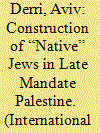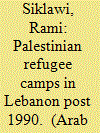| Srl | Item |
| 1 |
ID:
179850


|
|
|
|
|
| Summary/Abstract |
This article concerns the place of late Ottoman Jews in Palestine on the eve of the 1948 War. It focuses on Israel Ben-Zeʾev (Wolfensohn), a Jerusalem-born educator and Nahda intellectual who led a movement of self-identified “native” Jews, including both “Old Yishuv” Ashkenazim and Sephardim, to combat their marginalization by the Zionist institutions. I examine his lifetime struggle to advance the study of Arabic and “Arab Jews” (yahud ʿarab) under early Islam by creating institutions of knowledge production and educational programs modeled on those he knew from his early academic career in Cairo. It was in the context of these struggles that demands for separate political representation for native Jews and for a specialized field of Arab Jewish studies coalesced as part of a broader project of a shared Arab-Jewish cultural modernization. They culminated in 1948, when Ben-Zeʾev finally realized his Arabic library project, ironically using looted Palestinian books, only to see its destruction four years later by Zionist leaders and Hebrew University professors.
|
|
|
|
|
|
|
|
|
|
|
|
|
|
|
|
| 2 |
ID:
164744


|
|
|
|
|
| Summary/Abstract |
This article addresses the issue of the Palestinian refugees in Lebanon, their camps, their resistance, and the challenges they have been facing “as refugees” to survive in the deeply divided state of Lebanon and to return to Palestine. Currently there are about 450,000 Palestinian refugees scattered among 12 official and recognized Palestinian refugee camps in Lebanon as well as many refugee gatherings; this number is part of the 6 million Palestinian refugees who are scattered in the world as a result of the establishment of the Zionist entity in 1948. However, on December 11, 1948, the United Nations General Assembly issued the UN resolution 194, during its third session, which stipulated that Palestinians have the right of return to their homes in Palestine. The Palestinian right of return is a Right and therefore it is not negotiable and cannot be compromised under any condition and/or circumstance. There have been continual attempts and proposals to terminate this Palestinian right of return to historic Palestine. To stop these toxic proposals from reaching their goals and to achieve their strategic goal, the Palestinian resistance has the legitimate right to use any means necessary, including armed struggle against the occupiers. The Palestinians in Lebanon are part of this process and they have been struggling on all levels to achieve their civil and human rights in order to improve their social and economic conditions in their refugee camps. Furthermore, the Palestinians have the legitimate right to continue their national struggle against Israel, which is the only way for the Palestinians to achieve their national goal for total liberation. However, there have been additional challenges affecting the Palestinians and their refugee camps in Lebanon post 1990; by the end of the Lebanese Civil War, the Palestinian refugee camps witnessed the emergence and growth of takfiri groups. Consequently, the Palestinian refugees have been sandwiched between oppressive Lebanese rules and the rise of the takfiris inside the camps. The article attempts to answer the following questions: What are the challenges affecting the Palestinian refugees in Lebanon? How can the Palestinians protect their identity from erasure and achieve their right of return to Palestine? Which internal and external groups currently control the camps? In what ways has takfiri ideology impacted the Palestinian identity? How can the Palestinian refugees and their camps survive under such conditions?
|
|
|
|
|
|
|
|
|
|
|
|
|
|
|
|